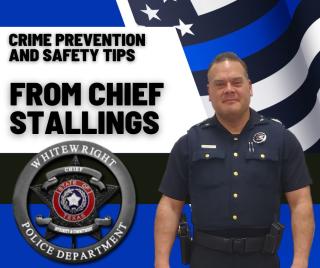4/07/23 Crime Prevention Tips

It occurred to me to day to post something about some of our rights as guaranteed by the Constitution.
I happen to be a big fan of Constitutional rights, and I take them seriously. After all, I am sworn to defend them, and I interpret that to mean I will protect yours. I don’t put them in “fine print,” hoping someone won’t notice and therefore say or do something that may make a criminal case. If I explain your rights to you, I want you to make sure you understand them.
“But won’t that make your job harder?”
Nope. I know what I’m doing. And the last thing I want to do is have to go to court to explain…on the witness stand…of why I or one of my officers said or did something that could be construed as unconstitutional.
Let’s take gander at the Fourth Amendment:
The right of the people to be secure in their persons, houses, papers, and effects, against unreasonable searches and seizures, shall not be violated, and no Warrants shall issue, but upon probable cause, supported by Oath or affirmation, and particularly describing the place to be searched, and the persons or things to be seized.
This is the meat-and-potatoes of police work. Contrary to popular belief, In the pre-revolution days, the British authorities generally respected private property…except when they didn’t. Citing some kind of vague danger, threat, or emergency, they could serve a “general warrant” which was basically a free pass to search a home for anything and everything. It was also a semi-legal way to collect taxation for the Crown: “That’s a nice-looking silver tea set! By Jove, it looks like just enough to cover the new taxes we just thought of! The King thanks you!”
Today, especially after challenging and testing by the Supreme Court over 200 years, your rights are fairly well outlined. This is immutable and fixed, and in terms of searches and seizures, the general trend is that the Supreme Court limits police power rather than broadens them.
I don’t want to make this a law school class, but here are some fun facts for your consideration:
1) Law enforcement has three, and ONLY three, ways to enter private property. A warrant, owner consent, and an exigent circumstance (hot pursuit, imminent danger to someone)
2) Motor vehicles are considered less private than homes, and not as well covered by the Fourth Amendment. As one lawyer put it, “The Supreme Court hates cars.”
3) If a police officer asks your permission to search your car, or house, or your backpack, etc…you can refuse. Don’t feel intimidated; it’s your Constitutional right.
4) If something is in “plain view” it can be seized and used as evidence in a criminal case. As long as getting to that point…consensual entrance into a home, or lawful traffic stop…is legit, then evidence can be seized if it’s in plain view.
Coercion is another issue to be aware of. As Justice Potter Stewart once said, “Where there is coercion, there is no consent.” No police officer can intimidate, threaten, or otherwise suggest severe consequence for NOT granting consent. “Can I search your vehicle? By the way, you have a warrant out for your arrest…” Not good! If a court finds that a “consent” search was coerced, ANYTHING found as a result of that search will be inadmissible as evidence. That…and that officer will look not-so-great.
I seriously hate bullies. And I cannot stand when some police officers act like them. Being authoritative is one thing, picking on someone just because you think you can is something else. I will not abide that kind of behavior here.
So, enjoy your rights! After all, lot of people have sacrificed a great deal for them throughout our history.
Stay safe out there and have a great week!
-Chief Stallings



